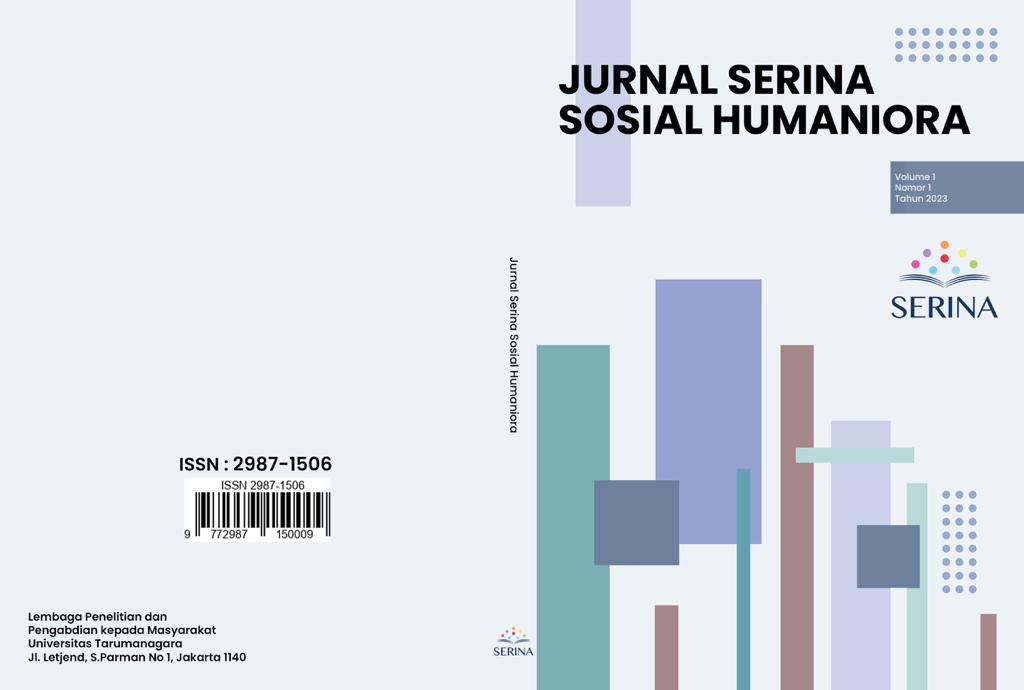SOTO LOLI: PROGRAM UNTUK MENGURANGI TINGKAT KESEPIAN KARYAWAN DEPARTEMEN HUMAN RESOURCE DEVELOPMENT (HRD) DI PERUSAHAAN X
Main Article Content
Abstract
ABSTRACT
The Covid-19 pandemic has changed the life system in Indonesia a lot. One of the impacts is the change in activities ranging from education, work to daily activities from those that were originally run offline to run online. One of the policies implemented during the Covid-19 pandemic is the Work From Home (WFH) system. WFH is a work arrangement that allows a person to carry out all the important responsibilities of his job while staying at home. The implementation of the WFH working system not only has positive but also negative impacts, one of which is creating a sense of loneliness. This study was made to implement a program, namely SoTo Loli to reduce the loneliness felt by employees while working at home. Participants in this study consisted of 12 employees in the HRD Department of Company X. The results showed that the SoTo Loli program was considered to provide benefits for increasing closeness between employees and reducing the feeling of loneliness felt by employees while working from home. However, there is an evaluation in the implementation of the program that must be made more varied and the time span is not too far away so that the benefits generated are more pronounced.
Keywords: WFH, loneliness, employees
ABSTRAK
Masa pandemi Covid-19 telah banyak mengubah sistem kehidupan di Indonesia. Salah satu dampaknya ialah berubahnya aktivitas dari mulai pendidikan, pekerjaan hingga ke aktivitas sehari-hari dari yang semula dijalankan secara offline menjadi dijalankan secara online. Salah satu kebijakan yang diterapkan selama masa pandemi Covid-19 ialah adanya sistem bekerja Work From Home (WFH). WFH ialah pengaturan kerja yang memungkinkan seseorang untuk menjalankan seluruh tanggung jawab penting dari pekerjaannya dengan tetap di rumah. Pemberlakuan sistem bekerja WFH tidak hanya memberikan dampak positif tetapi juga negatif, salah satunya adalah memunculkan rasa kesepian. Penelitian ini dibuat guna menerapkan suatu program yaitu SoTo Loli guna mengurangi kesepian yang dirasakan karyawan selama bekerja di rumah. Partisipan dalam penelitian ini terdiri dari 12 karyawan di Departemen HRD Perusahaan X. Hasilnya menunjukkan bahwa program SoTo Loli dinilai memberikan manfaat untuk menambah kedekatan antar karyawan serta mengurangi rasa kesepian yang dirasakan karyawan selama bekerja dari rumah. Namun, terdapat evaluasi dalam pelaksanaan program tersebut harus dibuat lebih bervariatif dan rentang waktunya tidak terlalu jauh agar manfaat yang ditimbulkan lebih terasa.
Kata Kunci: WFH, kesepian, karyawan
Article Details
References
Cacioppo, J. T., Hughes, M. E., Waite, L. J., Hawkley, L. C., & Thisted, R. A. (2006). Loneliness as a specific risk factor for depressive symptoms: Cross-sectional and longitudinal analyses. Psychology and Aging, 21(1), 140–151. https://doi.org/10.1037/0882-7974.21.1.140
Holmes, E. A., O'Connor, R. C., Perry, V. H., Tracey, I., Wessely, S., Arseneault, L., Ballard, C., Christensen, H., Cohen Silver, R., Everall, I., Ford, T., John, A., Kabir, T., King, K., Madan, I., Michie, S., Przybylski, A. K., Shafran, R., Sweeney, A., … Bullmore, E. (2020). Multidisciplinary research priorities for the COVID-19 pandemic: A call for action for mental health science. The Lancet Psychiatry, 7(6), 547–560. https://doi.org/10.1016/s2215-0366(20)30168-1
Holt-Lunstad, J., Smith, T. B., Baker, M., Harris, T., & Stephenson, D. (2015). Loneliness and social isolation as risk factors for mortality. Perspectives on Psychological Science, 10(2), 227–237. https://doi.org/10.1177/1745691614568352
Kemendikbud.go.id, K. (2020, March 17). Se Mendikbud: Pembelajaran secara daring dan bekerja dari rumah Untuk mencegah penyebaran covid-19. Kementerian Pendidikan, Kebudayaan, Riset, dan Teknologi. Retrieved November 16, 2022, from https://www.kemdikbud.go.id/main/blog/2020/03/se-mendikbud-pembelajaran-secara-daring-dan-bekerja-dari-rumah-untuk-mencegah-penyebaran-covid19
Kniffin, K. M., Narayanan, J., Anseel, F., Antonakis, J., Ashford, S. P., Bakker, A. B., Bamberger, P., Bapuji, H., Bhave, D. P., Choi, V. K., Creary, S. J., Demerouti, E., Flynn, F. J., Gelfand, M. J., Greer, L. L., Johns, G., Kesebir, S., Klein, P. G., Lee, S. Y., … Vugt, M. van. (2021). Covid-19 and the workplace: Implications, issues, and insights for future research and action. American Psychologist, 76(1), 63–77. https://doi.org/10.1037/amp0000716
Mungkasa, O. (2020). Bekerja dari rumah (Working From Home/WFH): Menuju tatanan baru era pandemi covid-19. The Indonesian Journal of Development Planning. https://journal.bappenas.go.id/index.php/jpp/article/download/119/81/
Mustajab, D., Bauw, A., Rasyid, A., Irawan, A., Akbar, M. A., & Hamid, M. A. (2020). Fenomena bekerja dari rumah sebagai upaya mencegah serangan covid-19 dan dampaknya terhadap produktifitas kerja. The International Journal of Applief Business Tijab , 4(1). https://doi.org/https://e-journal.unair.ac.id/TIJAB/article/download/18574/10248/70164
Nakrošienė, A., Bučiūnienė, I., & Goštautaitė, B. (2019). Working from home: Characteristics and outcomes of Telework. International Journal of Manpower, 40(1), 87–101. https://doi.org/10.1108/ijm-07-2017-0172
Rinaldi, M. R. (2021). Kesepian pada Mahasiswa selama Pandemi COVID-19. Jurnal Psikologi Teori Dan Terapan, 11(3), 267–277. https://doi.org/http://dx.doi.org/10.26740/jptt.v11n3.p267-277
Trisnasari, S. A., & Wicaksono, D. A. (2021). Pengaruh Loneliness Terhadap job stress Pekerja work from home (WFH) Pada Masa pandemi covid-19. Buletin Riset Psikologi Dan Kesehatan Mental (BRPKM), 1(2), 1218–1226. https://doi.org/10.20473/brpkm.v1i2.28444



